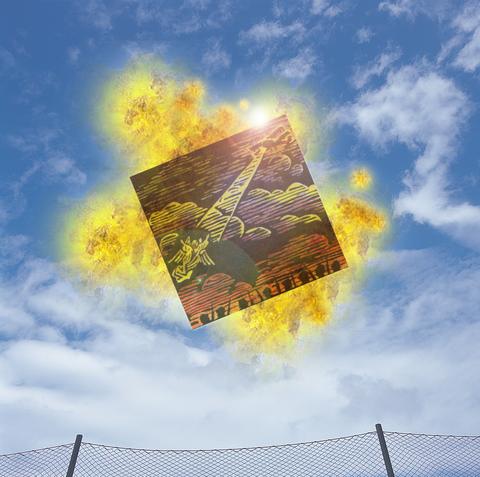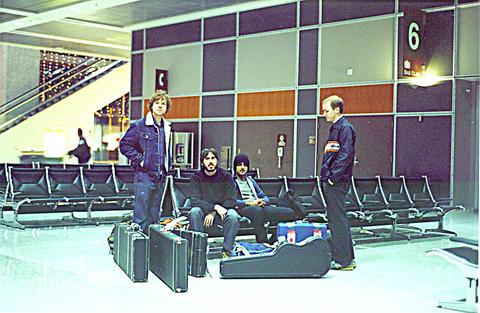An album called Those Who Tell the Truth Shall Die, Those Who Tell the Truth Shall Live Forever was released on Sept. 4, 2001, but since promotional copies did not reach critics and magazines until some days later, a story arose that the album had actually been released on Sept. 10. The album was themed on war and ended with a track called Plane Will Crash Tomorrow. The band that produced it was called Explosions in the Sky.
"People who listen to the album find it to be a bit eerie," said Munaf Rayani, one of two guitarists in the Austin, Texas-based band. "And it's eerie to us too that it all came out that way, because we came up with the title a year before, you know, this tragedy. The album was ready to go seven months prior to everything."

CD COVER COURTESY OF TEMPORARY RESIDENCE
Tomorrow night and Sunday afternoon, Explosions in the Sky will play shows at Taipei's Zeitgeist, with local bands opening.

PHOTO COURTESY OF ANGELS-GONE.COM
The performances have been organized by Wu Hsiao-hwa
In a lot of ways, Explosions' sound is a natural draw for the moody core of Taipei's underground rock scene, a fan base that's been proud of venerating bands like Yo La Tengo and Mogwai.
Though Explosions is still only two-albums-old, many US reviewers see it as a successor to Mogwai (formed 1995) and Godspeed You Black Emperor! (formed 1994), the two biggest names in instrumental post-rock. But when they call Explosions "awesome," it's still probably more out of anticipation than achievement.
The post-rock genre is based on traditional rock instruments, but seeks out a fuller range of emotions in music, not just the quick, ecstatic high that rock is known for. Often cinematic in feel, post-rock also has cast aside the cynicism of punk and 80s/90s alternative and, more often than not, gotten rid of the lyrics along with it.
"Our two big ideas that we shoot for are sadness and triumph, and in those two, I don't know if cynicism fits so well," said Rayani.
Explosions' record label, Temporary Residence, describes the band's sound as "silence to violence." Rayani explained it: "I don't want to sound lame or arty or anything, but we do our best to sing with our guitars. Like [the guitar lines are] supposed to be the vocal melody."
In a way, the expressive movement is larger than rock, popping up everywhere from the brutal, show-all revolution of digital filmmaking to the natural, statistical emphasis of contemporary science and philosophy. The yearning is toward a purer, more direct language, a thought Rayani expressed when he welcomed the idea of coming to Taipei and not knowing how to speak Mandarin: "I almost prefer that we be not really able to communicate through language. I want to be in a place where I don't know what everybody is saying all the time."
But on a more day-to-day level, what all this zeitgeist has meant for indie music and the kids of America is lots of post-rock bands.
"Why Mogwai and Godspeed are so important is that they really changed the face of music," said Rayani. "In the [last] three months that we've been touring, we have discovered sooo many instrumental rock bands. ... It's almost like how Sonic Youth changed music."
Explosions was formed in July 1999 by Rayani (guitar), two friends he grew up with in Midland, Texas, Mark T. Smith (guitar) and Michael James (bass) and Chris Hrasky (drums). They came together in Austin, home of slacker culture and the richest indie music scene in the American southwest.
With the Taiwan shows, the band will be coming to the end of nearly four months of touring, including about six weeks in Europe.
"This is our best tour yet. We actually came home with rent money," said Rayani.
For Explosions, day jobs are still necessary between tours and when they travel, it's in a clunky, loveable and fully carpeted Dodge Family Van with four captain's chairs.
On the latest tour, a milestone for the band was opening a Houston show for Fugazi in front of 2,000 people, the biggest crowd they've ever played for.
Behind the music, Explosions' songs are often inspired by movies or world events and are heavy in narrative overtones. One track on Those Who Tell the Truth contains a lengthy soliloquy from The Thin Red Line, and another coming out on the next album, Six days at the Bottom of the Ocean, was inspired by the 66-man crew of the Russian submarine Kursk, who were trapped and suffocated on the sea floor.
So maybe one can imagine the spooky resonance people found between Explosions music and the events of Sept. 11, 2001, especially with the freakishly coincidental release of Those Who Tell the Truth.
To be honest, Rayani thinks it was good for the band, mostly because it got them lots of publicity. Around 30 college radio stations refused to play them, he said, and a major music magazine, NME, ranked them second on a list of bands in need of a name change.
But if anything, what was behind Those Who Tell the Truth was more Austin irony, less prophetic subversion. They got the album name from a guy working at Star Seeds, a well-known Austin cafe, who described to them a documentary about the assassination of his favorite filmmaker, Pier Paolo Pasolini. He said the film was called Those Who Tell the Truth Shall Die.
"And we were, like, that's about the greatest title I've ever heard in my life," said Rayani. But the band changed it a little, taking into account the power of the words and acts of the martyred. So they added the second phrase: "Those Who Tell the Truth Shall Live Forever."
Later they discovered that the documentary whose title they stole had never even existed. Now is that eerie or irony? They'll probably choose to describe it as the former.
What: Explosions in the Sky
Where: Zeitgeist, B1, 122 Chunghsiao E. Rd., Sec. 2, Taipei
When: Tomorrow 8pm and Sunday 3pm
Tickets: NT$950 through Acer ticketing

On April 26, The Lancet published a letter from two doctors at Taichung-based China Medical University Hospital (CMUH) warning that “Taiwan’s Health Care System is on the Brink of Collapse.” The authors said that “Years of policy inaction and mismanagement of resources have led to the National Health Insurance system operating under unsustainable conditions.” The pushback was immediate. Errors in the paper were quickly identified and publicized, to discredit the authors (the hospital apologized). CNA reported that CMUH said the letter described Taiwan in 2021 as having 62 nurses per 10,000 people, when the correct number was 78 nurses per 10,000

As we live longer, our risk of cognitive impairment is increasing. How can we delay the onset of symptoms? Do we have to give up every indulgence or can small changes make a difference? We asked neurologists for tips on how to keep our brains healthy for life. TAKE CARE OF YOUR HEALTH “All of the sensible things that apply to bodily health apply to brain health,” says Suzanne O’Sullivan, a consultant in neurology at the National Hospital for Neurology and Neurosurgery in London, and the author of The Age of Diagnosis. “When you’re 20, you can get away with absolute

May 5 to May 11 What started out as friction between Taiwanese students at Taichung First High School and a Japanese head cook escalated dramatically over the first two weeks of May 1927. It began on April 30 when the cook’s wife knew that lotus starch used in that night’s dinner had rat feces in it, but failed to inform staff until the meal was already prepared. The students believed that her silence was intentional, and filed a complaint. The school’s Japanese administrators sided with the cook’s family, dismissing the students as troublemakers and clamping down on their freedoms — with

As Donald Trump’s executive order in March led to the shuttering of Voice of America (VOA) — the global broadcaster whose roots date back to the fight against Nazi propaganda — he quickly attracted support from figures not used to aligning themselves with any US administration. Trump had ordered the US Agency for Global Media, the federal agency that funds VOA and other groups promoting independent journalism overseas, to be “eliminated to the maximum extent consistent with applicable law.” The decision suddenly halted programming in 49 languages to more than 425 million people. In Moscow, Margarita Simonyan, the hardline editor-in-chief of the